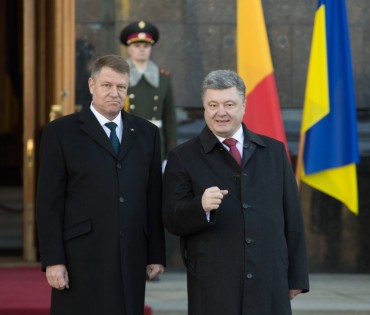The Institute of World Policy prepared a memo ahead of the visit of the President of Ukraine Petro Poroshenko to Romania on the signals worth sending to the Romanian decision-makers and society.During his visit to Romania President of Ukraine Petro Poroshenko should:
– Appreciate Romania’s firm support for Ukraine’s sovereignty, territorial integrity, including non-recognition of illegal annexation of Crimea, and European choice in international fora (in the EU, OSCE, UN, etc).
– Express gratitude to Romania for being first to ratify the Association Agreement Ukraine – EU
– Underline that Ukraine is interested in a strong, prosperous and influent Romania, a solid and coherent partner of Ukraine in the West;
– Express interest in Romania’s lessons learnt in the fight against corruption. Underline that Ukraine is committed to fighting corruption, especially high-level corruption, as the prime condition for a strong state, and nothing, even an ongoing war, will prevent it
– Ukraine’s new government is committed to implementing reforms in various areas: from rule of law, anticorruption, professionalisation of armed forces, police reform, to child protection system and national minorities. Meeting expectations of international partners (IMF, etc) will be the absolute priority of the new government, as well as consolidating the country’s credibility and creating a healthy environment for international support to come in and produce the best results
– Express interest in the energy sector’s cooperation with Romania. Examine the possibility for reverse gas supply, even symbolically
– Interest in working ever closer with Central-Eastern Europe countries, especially Romania and Poland perhaps, which have met with the same hurdles, challenges, delays and have successfully overcome them. Their success is in itself the most powerful incentive for Ukraine to do the same, especially in what regards the implementation of the Association Agreement
– start a dialogue on organizing a Ukraine-Romania business forum in Bucharest.
On security:
– Express shared concern about security in the Black Sea region and willingness to cooperate in order to counter the Russian threat. Stress the inviolability of fundamental principles of the UN and of international law as the instrumental principle of engagement with Russia
– Underline Ukraine’s common position with Romania regarding reconfirmation of NATO commitment to increased security in the region at the Warsaw NATO Summit
– The militarization of the Black Sea and of the entire region is an imminent threat to the security of the region. It is important for the two Presidents to continue to keep this issue on the international radar and ask for a serious deterrence to this threat. It is important for the two presidents to follow up on the initiative of a Black Sea Fleet that would include one Ukrainian vessel. Maritime security in the Black Sea it is of paramount importance, and more concrete measures, such as this one, are needed to deter Russia. The initiative needs to be designed together with Turkey and, ideally, Georgia, and be advocated for at the Warsaw summit. In preparation for the summit, an advocacy effort that involves all four countries would be needed.
– Express the interest that Ukraine joins or initiates military exercises on countering hybrid war and covert external threats. The exercise could be joined by NATO member states such as US, Poland, Lithuania, Norway, Estonia, Latvia but also non-NATO states such as Georgia and Republic of Moldova. This initiative might be useful especially in light of NATO Warsaw summit discussion on strategic adaptation of the Alliance and the developments in NATO’s strategies to counter hybrid war
– thank Romania for treating Ukrainian soldiers, recent non-lethal military transfers, and leading NATO’s trust fund on cybersecurity for Ukraine
On the issue of national minorities:
– Underline that the Ukrainian minority in Romania and the Romanian minority in Ukraine are precious assets for closer ties and fruitful cooperation between the two countries; Ukraine appreciates the fact that the representatives of the Romanian minority in Ukraine fight shoulder to shoulder in Donbas, together with Ukrainians
– express commitment for equal rights for and protection of minorities, including the Romanian minorities living in Ukraine
On the Republic of Moldova:
– Underline that, as neighbours and friends of the Republic of Moldova, both Ukraine and Romania are firmly committed to support further progress of that country along the path of European integration;
– Emphasize Ukraine’s commitment to the political resolution of the Transnistrian conflict with full respect for the territorial integrity of the Republic of Moldova; Ukraine is also interested in the implementation of the DCFTA in the Trasnistrian area.
The President should be ready to the questions about:
– Yatseniuk’s resignation, composition of the new government, influence of oligarchs on the political process and its capacity to implement reforms;
– the situation in Donbas and Crimea (also, underline that the conflict in Donbas is still ongoing since many average Romanians are unaware of this)
– a possible failure of the Minsk process.
– Ukraine’s perception of the Dutch referendum results
– the rights of Romanian minority who lives in Ukraine (in particular the Ukrainian citizenship law, the law on regional languages, the drop in numbers of Romanian schools in Ukraine, etc.).
In order to maximize the effect of his messages the President should:
– address the Romanian public in Romanian language;
– hold an open discussion/debate, which would be open to the media;
– ask the media to take the Russian propaganda threat very seriously and double-check the information they use;
– ask the media to pay more attention to what happens in Ukraine
This memo was prepared by IWP experts Alyona Getmanchuk, Kateryna Zarembo, Leonid Litra.
The Institute of World Policy is grateful to Ileana Racheru, Alina Inayeh, Sergiu Celac, Bogdan Nedea, Iulian Chifu. Oana Popescu, Sergiu Panainte, Stanislav Secrieru, Armand Gosu, Alina Matis for their contributions to this memo.




Comments theme
Comments themeComments themeComments themeComments themeComments themeComments themeComments themeComments themeComments themeComments themeComments themeComments themeComments themeComments themeComments themeComments themeComments themeComments themeComments themeComments.